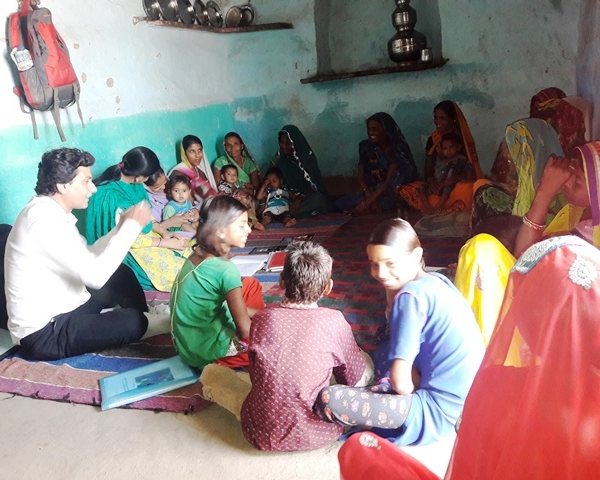An ICDP day in action by the team of trainee facilitators from Save the Children India, applying for the first time ICDP, as part of their work in the poor villages in Rajasthan.
A group of ten facilitators are for the first time applying the principles and guidelines of the ICDP programme with groups of parents and their children, and yet they are confident, warm and inspiring. Families are happy to be talking in a circle, in a relaxed manner, there is some laughter; sharing of personal ideas and examples from daily practice and in relation to their views and ways of bringing up children seem to be flowing effortlessly.
Role play proved to be a very useful tool, in addition to showing videos which seem to be the best vehicle for sparking off discussions about the different themes covered by the programme. Some of the participants attempt to do role play with great success and to everyone’s delight – ICDP topics are clarified through such participation with ease and enjoyment. Mothers are accompanied by their young children and some older ones, who participate vividly in the process, once they overcome their shyness.
It is a simple and joyful process, carried out in a friendly and warm manner and everyone seems to be happy to be part of. Photos are used for clarification and as an incentive to make the group reflect on the themes. Facilitators are particularly good at sharing own experiences, they are describing their own families and children, sharing their own stories and little anecdotes – as a result most of the participants follow suit. The personal touch is powerful with this group of facilitators. Facilitators’ bright, smiling and open disposition is making participants relax and able to open up. There is a gentle guiding touch.
All the usual ICDP questions (such as, what does it mean to love your child, how do you show this in practice, what kind of situations in the daily routines offer opportunities to talk and share with your children, how do you say ‘no’ and set limits, how do you follow their initiative and support their projects etc.) seem to attract interest and willingness to explore their meaning through reflection and observation of concrete situations that are role played by two facilitators. Facilitators enjoy the process of observing others in interaction with the child – through this process the group started to give birth to something new and more positive that can help them in their daily dealings with their children. They recognized easily how not to do it and were quick to find the positive way that they know will please the child. Participant children understand this too.
Let us have more days like this seems to be the evaluation at the end of the day and all are keen to come back for more. What is the likely outcome of such sessions long term? A nice experience of sharing, making some new realizations, testing out and adopting some new ways of relating to children and consolidating what is already positive in their relationship with children; a process that can make children happy and eager to ask questions and learn, a process of achieving harmony in daily routines, a happier home and family…
I enjoyed accompanying the trainee facilitators to their sessions in Bhinda, a very promising and talented team of people. – Nicoletta Armstrong’s notes, a day in the field, April 2017.


